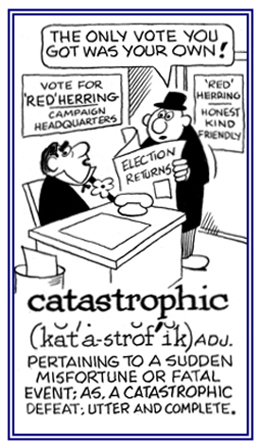stroph-, -strophy, -strophe, -strophical, -strophism, -strophic, -strophes, strepto-, strept-
(Greek: turn, twist; bend)
anastrophe, anastrophy
1. An alteration of the normal order of words or phrases in a grammatical construction, usually for rhetorical effect.
2. In rhetoric, the inversion of the natural or usual order of words; such as, "Homeward directly he went." "To market went she."
3. In computing, an operation by which each digit of a binary number is changed to the alternative digit, as 10110 to 01001.
2. In rhetoric, the inversion of the natural or usual order of words; such as, "Homeward directly he went." "To market went she."
3. In computing, an operation by which each digit of a binary number is changed to the alternative digit, as 10110 to 01001.
angiostrophe
The twisting of a vessel to arrest or stop a hemorrhage.
angiostrophy
The twisting of the cut end of a blood vessel to stop bleeding.
antistrophe
apostrophe
1. An ancient form of writing with lines alternately written left-to-right and right-to-left: "Boustrophedon is actually a philologists' techspeak and typesetters' jargon."
"Erudite or knowledgeable hackers use boustrophedons for an optimization performed by some computer-typesetting software and moving-head printers."
2. Etymology: from Greek, "turning as an ox in plowing" or "as the ox plows (ploughs)", from bous, "ox" + strephein, "to turn".
1. An ancient way of writing manuscripts and other inscriptions in which, rather than going from left to right as in modern English, or right to left as in Arabic, alternate lines must be read in opposite directions: "As a student of ancient writings, Jamie was interested in the boustrophedon texts that he discovered in some classical documents."
2. Etymologically these words come from Greek βους, "ox" and στρεφειν, "to turn", because the hand of the writer went back and forth like an ox drawing a plow across a field and turning at the end of each row to return in the opposite direction.
2. Etymologically these words come from Greek βους, "ox" and στρεφειν, "to turn", because the hand of the writer went back and forth like an ox drawing a plow across a field and turning at the end of each row to return in the opposite direction.
A procedure in which connections of sections are mapped in a zig-zag manner: In mathematics, the boustrophedon transform is computed by filling in a triangle in a process which maps one sequence to another.
boustrophedonic (adjective), more boustrophedonic, most boustrophedonic
1. A reference to the ancient method of writing in which the lines are inscribed alternately from right to left and from left to right.
2. Having a back-and-forth motion with a small step at right angles to the transit at each pass, as in a scanning device.
3. Etymology: turning like oxen in ploughing; a term used only in early Greek writing, which went from left to right and then right to left alternately.
2. Having a back-and-forth motion with a small step at right angles to the transit at each pass, as in a scanning device.
3. Etymology: turning like oxen in ploughing; a term used only in early Greek writing, which went from left to right and then right to left alternately.
Scanning in which the detector that records isotopic emissions moves in alternating opposite directions in a descending series of horizontal lines.
boustrophedonically (adverb), more boustrophedonically, most boustrophedonically
Relating to something that is written alternately from right to left and from left to right, like the course of the plough in successive furrows; as in various ancient inscriptions in Greek and some other languages: "Using boustrophedonically constructed programs is said to be one of the methods preferred by some hackers."
catastrophe
1. A terrible disaster or accident; especially, one that leads to a great loss of life.
2. A total or absolute failure, often in humiliating or embarrassing circumstances.
3. In geology, a violent seismic change; a sudden and violent change in the Earth's crust caused by an earthquake, flood, or any other natural process; a cataclysm.
4. An insurance event causing huge insurance claims, or an event causing losses of insured property above a specific monetary limit and affecting a substantial number of policyholders and insurers.
5. Etymology: from the 1530's, "reversal of what is expected"; especially, a fatal turning point in a drama, from Latin catastropha, from Greek katastrophe, "an overturning; a sudden end"; from katastrephein, "to overturn, to turn down, to trample on; to come to an end"; from kata "down" + strephein "to turn" and directly related to Greek strophe, originally "a turning" with reference to the section of an ode sung by a chorus while turning in one direction. The extension to "sudden disaster" is first recorded in 1748.
2. A total or absolute failure, often in humiliating or embarrassing circumstances.
3. In geology, a violent seismic change; a sudden and violent change in the Earth's crust caused by an earthquake, flood, or any other natural process; a cataclysm.
4. An insurance event causing huge insurance claims, or an event causing losses of insured property above a specific monetary limit and affecting a substantial number of policyholders and insurers.
5. Etymology: from the 1530's, "reversal of what is expected"; especially, a fatal turning point in a drama, from Latin catastropha, from Greek katastrophe, "an overturning; a sudden end"; from katastrephein, "to overturn, to turn down, to trample on; to come to an end"; from kata "down" + strephein "to turn" and directly related to Greek strophe, originally "a turning" with reference to the section of an ode sung by a chorus while turning in one direction. The extension to "sudden disaster" is first recorded in 1748.
catastrophic
1. Causing a lot of damage, making people suffer; or causing or liable to cause widespread damage or death.
2. Used to describe something which is very bad.
3. So serious in nature as to require extensive, long-term, and expensive medical treatment.

© ALL rights are reserved.

© ALL rights are reserved.
Go to this Word A Day Revisited Index
2. Used to describe something which is very bad.
3. So serious in nature as to require extensive, long-term, and expensive medical treatment.


Go to this Word A Day Revisited Index
so you can see more of Mickey Bach's cartoons.
catastrophically
1. A reference to a momentous tragic event ranging from extreme misfortune or to extensive ruin.
2. Descriptive of violent or a destructive natural event; such as, a violent earthquake.
2. Descriptive of violent or a destructive natural event; such as, a violent earthquake.
diastrophe
Inter-related cross references involving word units meaning "bend, curve, turn": diversi-; diverticul-; flect-, flex-; gyro-; meand-; -plex; streph-; tors-; tropo-; verg-; vers-; volv-.
Showing page 1 out of 2 pages of 25 main-word entries or main-word-entry groups.

